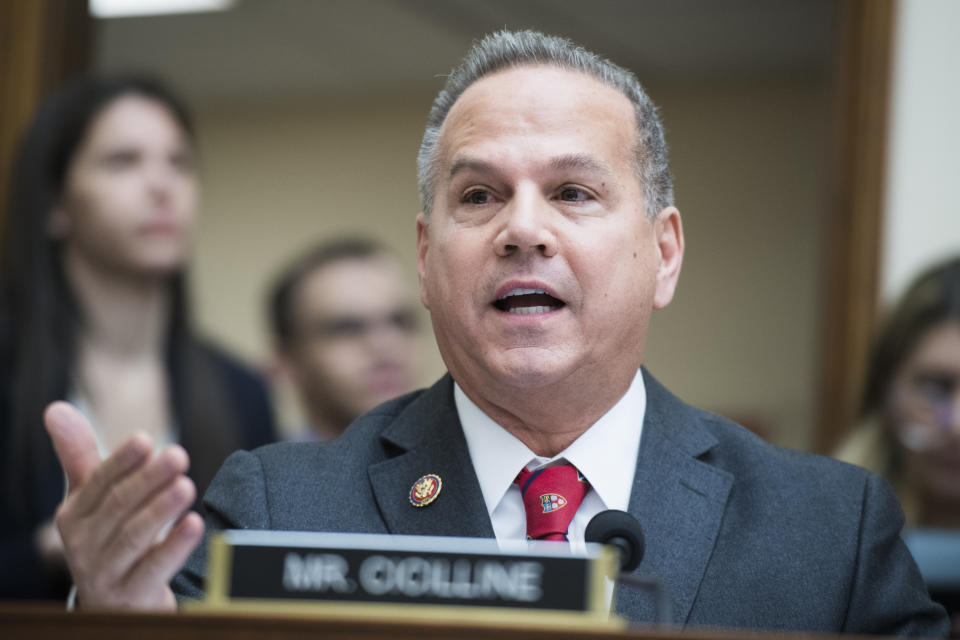Lawmakers kick off big tech antitrust probe, focusing on journalism
The House Judiciary committee kicked off its big tech antitrust investigation with a hearing on Tuesday.
Chairman of the antitrust subcommittee, Rep. David Cicilline (D-RI) called it the first significant antitrust investigation undertaken by Congress — which he said is long overdue.
“The sheer dominance of some platforms has resulted in worse products, and significantly less choice, leaving people without a competitive alternative to services that harvest their data, manipulate their behavior and monetize their attention,” said Cicilline in his opening remarks.
The top Republican on the House Judiciary committee, Rep. Doug Collins (R-GA), told Yahoo Finance he doesn’t view the probe as adversarial.
“Let’s have a conversation, in this new environment that has developed over the past 20 years, of how these entities operate in our environment today,” said Collins. “I view these as positive conversations between industries. Is there a role for the federal government? Is there not a role for the federal government?”
Cicilline and Collins have found common ground on the first topic up for discussion in the investigation: big tech’s impact on the press.
“The free and diverse press is the backbone of our vibrant democracy,” said Cicilline. “But over the past decade, the news industry has been in a state of economic free fall.”

The impact of big tech on a free and diverse press
On Tuesday, the House Judiciary Committee’s antitrust panel questioned stakeholders and experts about how platforms like Facebook (FB) and Google (GOOGL) have impacted journalism.
“The decline of the news industry is not the inevitable result of the arrival of the internet, but instead it’s a direct consequence of enforcement choices that have created a market structure where a small number of platforms are capturing the value created by journalists and publishers,” Cicilline said.
Cicilline and Collins have introduced a bill called the Journalism Competition and Preservation Act to allow newspapers to band together and negotiate with online platforms.
“News publishers rely on Google and Facebook for the vast majority of traffic online. Even minor changes to the platform’s algorithms can have significant effects on the news industry overall. Furthermore, as a result of this immense concentration of economic power, news publishers and local news in particular have little bargaining power with the online platforms, exacerbating the crisis of trustworthy news,” said Cicilline.
In an interview with Yahoo Finance, Collins said allowing publishers to band together could give them more power to negotiate access to ad revenues from platforms like Google and Facebook.
“We’re still open to see if there are tweaks [to the bill] that can be made from the tech perspective, or also from the content or newspaper publishing side. But this is at least a first step forward to say, ‘what we have seen in the decline of smaller papers and rural papers – is this something that could help maintain a good media interest in these areas and press availability for communities that may not have the transparency and accuracy that others do?’” Collins said.
‘Control over the news’
David Chavern, CEO of the News Media Alliance, a trade association which represents more than 2,000 newspapers, told lawmakers that a small number of dominant platforms now exercise an “extreme level of control over the news.”
“The result has been to siphon revenue away from news publishers. This trend is clear if you compare the growth in Google’s total advertising revenue to the decline in the news industry’s ad revenue,” said Chavern.
Chavern says current antitrust laws prevent news publishers from doing anything about the problem.

“No publisher on its own can stand up to the tech giants. The risk of demotion or exclusion from the platform is simply too great and antitrust laws prevent publishers from acting collectively,” Chavern said. “So the result is that publishers are forced to accept whatever terms and conditions are imposed on them.”
That’s why Chavern supports the Journalism Competition and Preservation Act, which would lift state and federal antitrust laws for publishers, for up to 48 months.
But Matt Schruers, with the Computer and Communications Industry Association, defended the tech industry. Schurers argued digital services provide benefits to news consumers, news producers and advertisers.
He said the internet encourages civic engagement, drives traffic to news sites and gives advertisers more information about how to reach customers.
“Technology has challenged some publishers’ business models — in part by ushering in extensive new competition, globalizing the advertising market and disrupting the dominant local ad position that many publishers once had.”
He said the competition over advertising money is “generally healthy” and antitrust exemptions would not solve the news industry’s problems.
“If competitors collude, prices will be higher, quality will decrease and innovation will slow,” said Schurers.
In a statement, Google told Yahoo Finance it has worked to be a “collaborative and supportive” partner to the news industry.
“Every month, Google News and Google Search drive over 10 billion clicks to publishers’ websites, which drive subscriptions and significant ad revenue. We’ve joined forces with publishers on projects ranging from helping improve their mobile experiences and supporting subscriptions to deep advertising partnerships. And last year, we launched the Google News Initiative, a major company-wide effort to help a range of quality journalism thrive,” said Richard Gingras, VP of News at Google.
The committee will continue to hold more hearings looking into anticompetitive behavior in the weeks and months ahead.
Jessica Smith is a reporter for Yahoo Finance based in Washington, D.C. Follow her on Twitter at @JessicaASmith8.
Uber CEO blames Trump’s ‘tariff wars’ for disappointing IPO
Senator warns of 'irreparable' consumer harm after data breach
Lawmakers, business groups warn new tariffs could derail new NAFTA
Read the latest financial and business news from Yahoo Finance
Follow Yahoo Finance on Twitter, Facebook, Instagram, Flipboard, LinkedIn, YouTube, and reddit.
